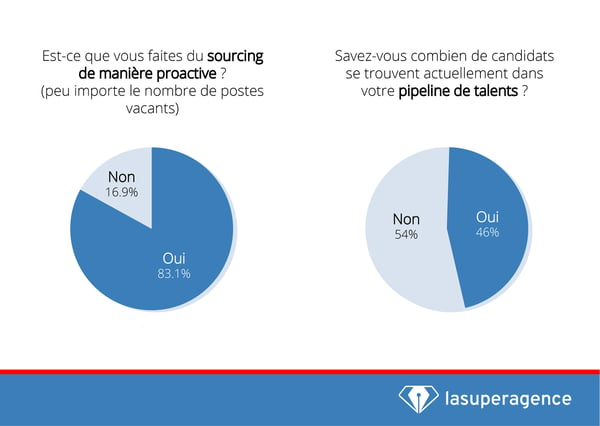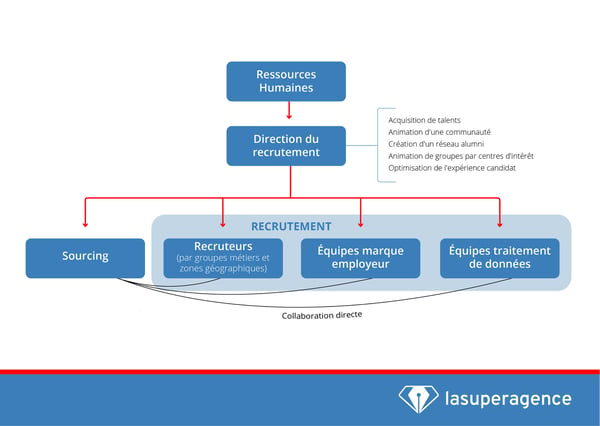As the stakes related to recruiting (especially that of highly sought-after talents) become higher and higher for company decision makers, it is then necessary for HR sourcing to think carefully about its actions.
Strategic sourcing, that is, planning your tasks in anticipation of your future recruiting needs, helps meet this strategic need.
Strategic sourcing is more than a proactive approach
Strategic sourcing offers a process in which the approach to candidates is proactive, i.e., it does not depend on the number of positions to be filled at any given time, but on the needs defined in the company's strategic plan.
For this to be effective, it is essential for the strategic source to gather as much real-time candidate prospect data as possible (level of engagement with the employer brand, validation of qualifications, interactions with the career site, etc.).
Or, while 83% of companies proactively set up their sourcing, only 46% of them know exactly how many candidates are in their talent pipeline !

Strategic sourcing is directly linked to building a talent pipeline
How is that ?
Knowing how many candidates identify with you, are interested in your industry or the positions you might be offering is a huge advantage for your proactive actions. So why deprive yourself of it ?
It may be a simple lag : in this case, recruiters may have begun to proactively source but have not yet implemented a robust process for tracking their potential candidates.
If, on the other hand, it is not a mismatch, then it means that some companies have followed this trend of "proactive sourcing " without understanding the logic behind their actions.
A definition of strategic sourcing
Strategic sourcing is not just a trend, but a real value-add for recruiting teams.
This is a departure from the active-candidate-oriented, actual-search approach by opening up to a continuous talent-acquisition approach, likely to capture both active and passive candidates.
The words " proactive " and " strategic " are sometimes interchangeable in this context - although they differ technically. Strategic sourcing is, in this case, " proactive " but the term " strategic " refers to the long-term vision, taking into account the company's overall goals.
Strategic sourcing is broken down into several actions :
- Establish your employer brand's presence in the minds of targeted candidates, with an eye toward building a lasting relationship with them.
- Predict recruitment needs and identify the key success factors (KSFs) of your recruitment campaigns well in advance (1-3 years)
- Target your candidate-prospects by relying on quality content and moving away from the quantitative " post and pray " approach
- Provide critical information to your recruiting teams so they are always aware of updates to Candidate Personas
- Bring market intelligence to the rest of the recruiting organization
- Improve the speed and efficiency of your sourcing by training it on legacy marketing approaches like inbound recruiting
Why is strategic sourcing important ?
Strategic sourcing cleverly combines predicting your needs, reducing risk, optimizing your operations, and improving the overall quality of your recruitment process.
Sweet music, isn't it ?
This method can help, for example, in creating a predictive calendar based on building your current talent pipeline.
This allows HR teams to predict appointments, onboarding periods, training, projected workload, etc.
.What is the place of strategic sourcing in the Human Resources organization ?
The most successful HR departments organize themselves with a separate sourcing function, which occasionally works in project mode with the recruiting teams.

The place of strategic sourcing in the HR organization
This way, recruiting management can more easily distribute sourcing resources to recruiters (by job groups and geographies), employer brand teams and data processing teams.
Thus, recruiters receive qualified leads from the specialized sources, benefiting from valuable information about the candidates.
The data processing teams, who have a comprehensive understanding of the information and tools needed by the organization, work with the sources to create optimized processes for collecting candidate data, for example.
In addition, strategic sourcing plays a particularly important role in recruitment marketing, with a view to strengthening your employer brand.
In effect, sources have their eyes everywhere: one of your competitor's LinkedIn campaign here, a recruiting event there - they can take note of all this information and pass it on to marketing teams, giving them a competitive advantage and a starting point for future Inbound campaigns (or not).
This may not translate into more leads per source but it will contribute to the company's positioning, employer brand visibility and easier conversion of candidate leads quality over time.







